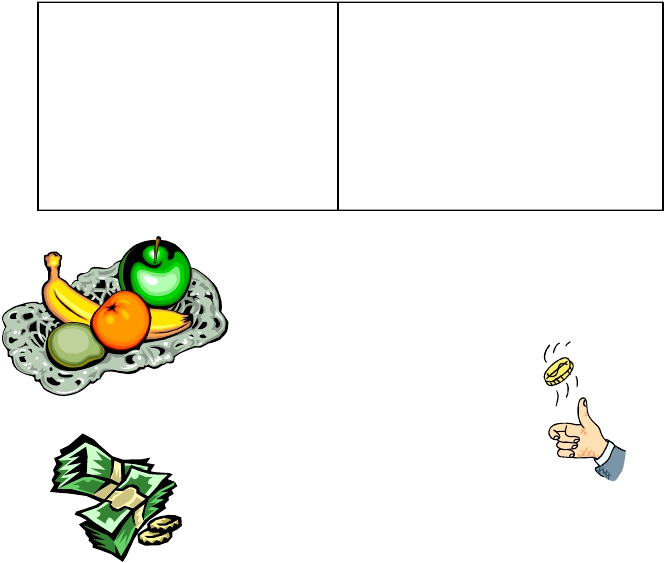
CATEGORIES:
BiologyChemistryConstructionCultureEcologyEconomyElectronicsFinanceGeographyHistoryInformaticsLawMathematicsMechanicsMedicineOtherPedagogyPhilosophyPhysicsPolicyPsychologySociologySportTourism
The passive voice is NOT a tense, it does not relate to time. You can
change the time by changing the verb Ďto beí.
• The house was damaged in the storm
• Many people have been taken prisoner
• Five people were killed in the accident
• My car is being repaired today
• More energy will be imported from Russia in the future
- 26 -

 Unit 10
Unit 10
Used to
A few years ago, I lived in a big city
Today, I live in the countryside. I used to live in a big
City.
Used to + verb (infinitive) àsomething I did in the past but donít do
Today.
• I stopped smoking last year. I used to smoke twenty cigarettes a
Day.
• I used to like her a lot, but then she changed. I donít like her very
Much now.
• Before we had children, we used to travel a lot, but now we donít
Travel any more.
• You play the piano, donít you? Ė I used to, but I donít have much
Time these days.
- 27 -
 Unit 11
Unit 11
Get used to
In Europe, people drive on the right. In England, people drive on the left.
When I came to England for the first time, it was difficult to get used to
Driving on the left.
Get used to + verb (-ing) Something that was difficult at first, but
Becomes normal with time or practice.
• When you go to live in a foreign country, it takes time to get used to
Living there.
Be used to
If you have got used to doing something, you can say that you are used
To doing it
• My job was hard at the beginning, but Iím used to it now
• Iím used to getting up early, but I didnít like it when I started
• France is very different from England, but Iím used to living here
Now
- 28 -





















 Unit 12
Unit 12
I will do
Future 1
I have a shower every day. This morning I
Had a shower. Tomorrow, I will have a
Shower.
I go
you will/won't do
he/she be
We have
They ...etc
|
You
He she it
We
They
go?
say?
do?
be?
Etc.
- 29 -

 Will is used for the future:
Will is used for the future:
• Tomorrow, I will be in Manchester on business
• Donít call tonight, I wonít be at home
• It will be a hard match, but Iím sure weíll win
Will often shows we are not sure
• I think it will rain this afternoon
• I donít know what to do Ė maybe Iíll ask Jan about it
Will can mean a spontaneous decision
• The phoneís ringing Ė Iíll answer it
If you donít have a pen Iíll lend you one
Shall
Shall is the same as will when used with I and we:
• I shall be late / I will be late
• We shall buy some souvenirs / we will buy some souvenirs
q
This is not an absolute rule as the following examples show:
ü You shall go to the ball, Cinderella
ü You shall be taken and hanged by your neck until you are
dead
ü She shall have music wherever she goes
- 30 -

 Unit 13
Unit 13
Going to
Planned/certain future (2)
Tonight there is a
football match on
television. I like
football.
Hi Jane, do you have
plans for tonight ?
Hi Jeanne, Iím going to
watch the football
match on television.
Past Present Future
I decide ďIím going I do it
to do to do itĒ
something
- 31 -










































 I am
I am
You are
She is
We are
They are
(not) going to
Do
Walk
Go
Make
etcÖ
If you have planned something for the future, you can say ĎIím going toÖí
• Iím going to cook Indian food tonight
• Iím going to talk to Ian about his attitude
We often use the present progressive to talk about future events:
ß What are you doing tonight?
ß Iím playing footballl
- 32 -
















 Unit 14
Unit 14
I had done
Past Progressive
My train left at 8:00
I was late, I arrived at 8:10
When I arrived at the station, my trainhad left
Past perfect = had + past participle
Past Present
Action 1 Action 2
The past progressive is used to show that action 1 happened before action 2.
• I didnít go to the meeting because it had been cancelled
Action 2 (simple past) Action 1 (past perfect)
• The streets were wet, so I knew it had been raining
- 33 -

 Unit 15
Unit 15
a/some
Nouns can be either countable or uncountable. We cannot make plurals
with uncountable nouns. We use Ďsomeí before uncountable nouns.
Countable
Chairs, tables, sofas
Euros, dollars, pounds
Jobs, professions
Clouds, temperatures, winds
Loaves, baguettes
Articles, reports, stories
Uncountable
furniture
money
work
weather
bread
news
ß An apple, an orange, a banana, a pear=
Some fruit
A dollar
Some money
- 34 -


 Unit 16
Unit 16
some/any
Date: 2015-12-11; view: 1063
| <== previous page | | | next page ==> |
| Ivan moved to London in 2002. He lives in London now. | | | Siobhan has some money |